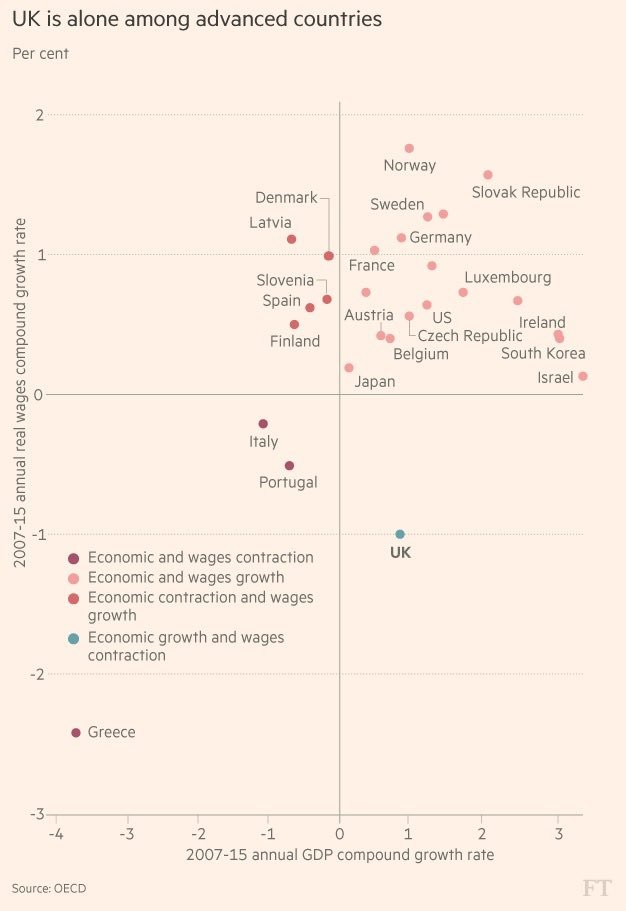This chart shows why Britain voted to Brexit
It plots economic growth from 2007 to 2015 against real annual wages (i.e. wages after adjusting for inflation):
Click to enlarge the image.
There is Britain alone in the bottom right quadrant: economic growth, but real wages actually dropping.
Inflation in 2015 was just 0.5%, the lowest in 50 years, so it's not the adjustment for inflation that has caused the numbers to plunge.
Instead it was immigration.
When the eastern europeans entered the EU in 2004, a transition arrangement was in place where they couldn't move to other EU countries for work till January 2012. The UK, Sweden and Ireland waived this, allowing migrants to move for work immediately. Sweden and Ireland are small economies, so the migrants headed to Britain.
So for the bulk of the period in the graph - 2007-12 - Britain was singlehandedly absorbing migrants from Eastern Europe. When the eastern europeans joined the EU they had high unemployment (Poland's unemployment was 25% back then), so a lot of people made the move.
Then came the Great Financial Crash of 2008/9, which caused native British unemployment. So now even more people were competing for scarce jobs.
Then the pièce de résistance: the Eurozone crisis. The Irish as usual headed for Britain, as they always do when their economy is in trouble. They were joined by desperate Southern Europeans. Why did the Southern Europeans come to Britain instead of going to Germany or the Netherlands? Because by this time a myth had grown in the EU about how easy it was to get a job in Britain because of lack of indirect barriers.
It was too much, the tsunami of migrants coming in were compressing wages. A fed-up Britain voted to leave the EU.
In the end 4.8 million EU citizens applied for and were granted settled status, of which an incredible 770,000 are claiming benefits (19% of the EU population in Britain). It's clear some came just to claim Britain's unique non-contributory benefits.
In the light of the above, Brexit was a rational decision.
It's true the post-Brexit govt has issued a lot of skilled worker visas. But the govt has the power to revoke those visas - and by ratcheting up the income threshold to £41,000 and removing occupations from the skilled visa list, they've made it impossible for some people on three-year visas to renew them. A sovereign parliament can even revoke Indefinite Leave to Remain.
However, while in the EU, Britain had no control over people with EU passports heading to Britain. Nor any control of EU member states handing out passports to all and sundry, hence the arrival in Britain of the Dutch-Somalis, Italian-Brazilians and so on.
The EU will have another crisis, but this time they won't be able to export their unemployed to the UK, as Britain has Brexited.

https://www.reddit.com/r/europe_sub/comments/1ohlgxr/this_chart_shows_why_britain_voted_to_brexit/
This post has been shared on Reddit by @rose98734 through the HivePosh initiative.